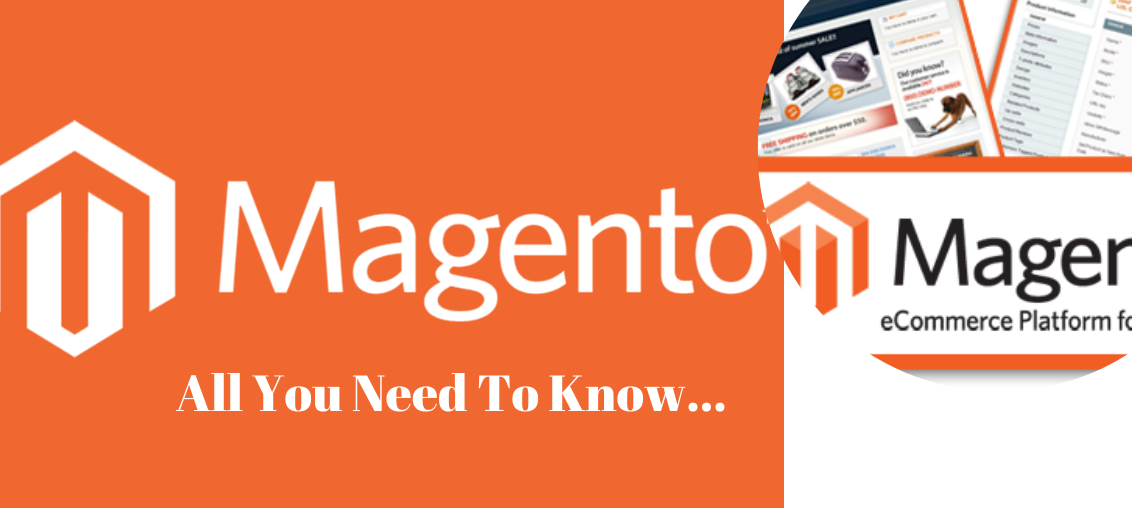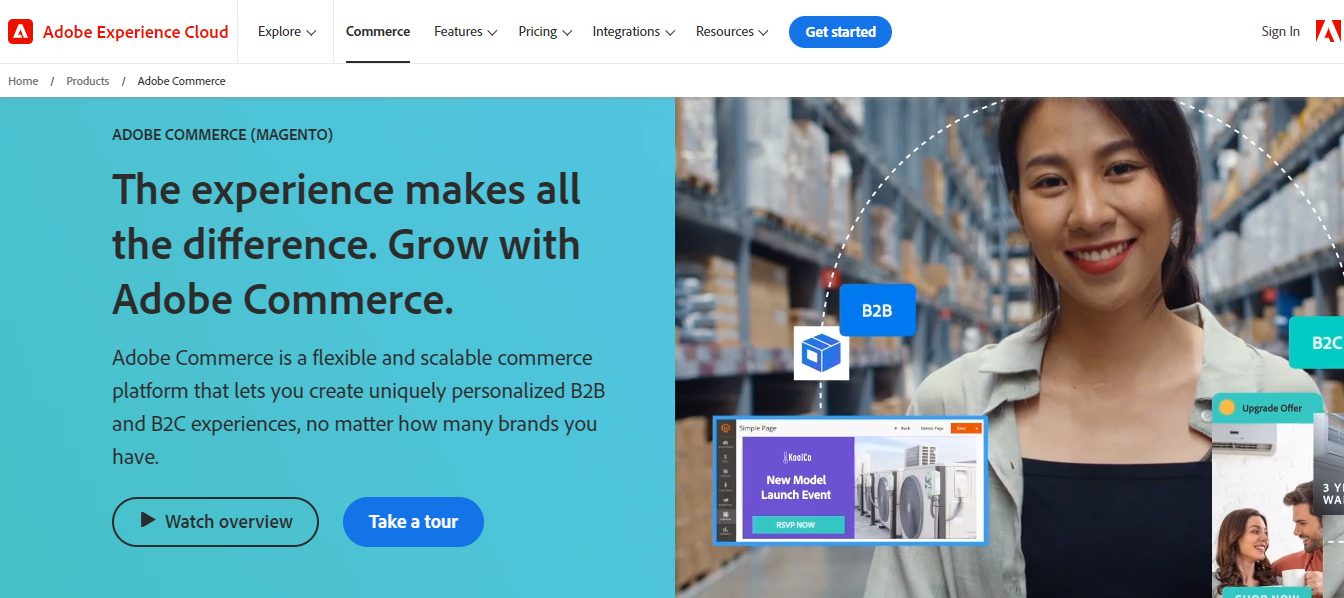What is the Magento platform? Read on as I answer the question.
In the modern world of e-commerce, there are many different online platforms for every taste. But if we talk about larger projects, only one CMS platform should be given attention. We will talk about it in this article in more detail.
We are talking about a CMS resource like Magento. It is one of the most popular platforms in the world, with hundreds of thousands of stores. It has appeared on the market since 2008, but Magento has not lost its popularity during this time.
Table of Contents
What Is Magento?
Let’s start with the concept. Magneto is an open-source CMS platform for e-commerce. Developers can even embed kernel files and extend its functionality by adding new plug-ins provided by other developers.
Magento is a solution with advanced product file management, which is one of the most important elements of professional e-commerce.
It promises to be able to design with an extended file, including all the information that can be offered to motivate a customer’s purchase decision, from the title to the description, images, and videos, as well as related and additional products.

If you are faced with the fact that you cannot figure out how to set up one or another process, then you need to contact Magento support services for help.
There is Magento Enterprise Edition, a derivative of Magento Open Source with duplicate core files. Still, it is not free and offers more features and functionality designed for large companies willing to hire technical support for installation, use, configuration, and troubleshooting for digital commerce and managing a physical store. Neither version offers web hosting.
And there’s Magento Commerce for Small Businesses. This cloud-based e-commerce solution includes web hosting provided by Magento Inc., an alternative designed to support small organizations and private businesses that don’t need to install the software.
It has built-in modules and extensions that you can add for more functionality, but it’s the least versatile version when customizing the experience for clients.

Magento: A Quick Reference Table
| Feature | Description | Advantage | Disadvantage |
|---|---|---|---|
| Platform Type | Open-source eCommerce platform | Highly customizable, access to source code | Requires technical knowledge or developer support |
| Scalability | Handles high-traffic volumes and large product catalogues | Suitable for growing businesses and enterprise needs | It can be resource-intensive for smaller stores |
| Features | Supports diverse product types, promotions, payment options, and integrations | Wide range of functionality out-of-the-box | May require additional extensions for specific needs |
| Customization | Highly customizable through themes and extensions | Tailored to unique business requirements | Complexity can increase development time and costs |
| Cost | Varies depending on setup, hosting, and development needs | Flexible pricing, but can be expensive for complex stores | Requires ongoing maintenance and potential upgrades |
| Security | Secure by default but requires regular updates | It is a trustworthy platform, but ongoing vigilance is needed | |
| Technical Expertise | Basic tasks are manageable, but complex customization requires developers | It has a user-friendly interface, but technical knowledge is an asset | |
| Alternatives | Shopify, WooCommerce, BigCommerce | Different platforms offer varying features and ease of use | Carefully evaluate features and costs before choosing |
Benefits Of Magento
In any of its versions, it offers as an e-commerce platform the ability to customize the store’s design and advanced management of products, orders, and customers. Accept multiple payment gateways and support multiple currencies and languages, including Spanish.
In addition, it allows for a multi-store system to improve the experience and offer, and facilitates online positioning and price ranges to which multiple projects can be adapted, including a less friendly but more versatile but reserved for open-source computers.
For those with the paid version, it offers easy installation and use because it is not complicated, and they do not need advanced technical knowledge to open an online store.
The platform promises a simple and intuitive admin panel to improve access and use of its features, as well as thousands of plugins to add drag and drop design, as well as to add visual personality and a responsive design that allows you to shop in the store. All this is done to improve and accelerate the development of the enterprise.
READ ALSO: Pros And Cons Of Open Source CMS
Magento: Frequently Asked Questions
What is Magento?
Magento is an open-source, flexible, and scalable eCommerce platform businesses of all sizes use to build online stores.
What are the advantages of using Magento?
- Wide range of features: Supports diverse product types, promotions, payment options, and integrations.
- Scalability: Can handle high-traffic volumes and large product catalogues.
- Customization: Highly customizable through extensions and themes to fit specific business needs.
- Open-source: Offers access to the source code, allowing for greater flexibility and development.
What are the disadvantages of using Magento?
- Cost: Can be expensive to set up and maintain, requiring development and hosting resources.
- Complexity: Requires technical knowledge or developer support to manage effectively.
- Security: Requires ongoing security updates and patching due to its open-source nature.
What are some alternatives to Magento?
- Shopify: User-friendly, all-in-one solution for smaller stores.
- WooCommerce: WordPress plugin for building online stores, requires web hosting.
- BigCommerce: SaaS platform with good scalability and ease of use.
How much does it cost to set up a Magento store?
Costs vary depending on factors like size and complexity of your store, chosen hosting, theme, and development needs. Basic setups start around $5,000, while enterprise-level solutions can exceed $50,000.
READ ALSO: Managing Open-Source Vulnerabilities Like A Pro!
Do I need a developer to use Magento?
While basic tasks are manageable, complex customization and development often require technical expertise. Hiring a Magento developer can help ensure smooth implementation and ongoing maintenance.
Is Magento secure?
Magento is secure by default, but like any software, it requires regular updates and security best practices to minimize vulnerabilities.
What are some popular Magento extensions?
Thousands of extensions exist to add functionalities like payment gateways, marketing tools, shipping integrations, and more. Choose reputable providers and ensure compatibility with your version.
What are some resources for learning Magento?
- Magento documentation: Extensive documentation and tutorials provided by Adobe.
- Magento University: Offers online courses and certifications for developers and merchants.
- Magento community forums: Online communities offer support and knowledge sharing among users.
Is Magento suitable for my business?
Consider your budget, technical expertise, store size, and desired functionalities. Magento can be a good choice if you need a powerful and flexible platform with customization options. However, its complexity and costs require careful evaluation before deciding.
Who owns Magento now?
As of October 26, 2023, Magento is owned by Adobe. They acquired the platform in May 2018 for $1.68 billion to integrate it into their Adobe Experience Cloud, an enterprise platform for managing customer experiences. Under Adobe’s ownership, Magento 2 was further developed and continues to be supported and updated as a robust eCommerce solution.
It’s important to note that Magento 1, the earlier version of the platform, is no longer officially supported by Adobe as of June 30, 2020. Businesses using Magento 1 are encouraged to migrate to Magento 2 to benefit from ongoing security updates, new features, and improved functionality.
Magento: Your Gateway to Powerful eCommerce
Magento is a flexible, open-source platform powering countless online stores. It boasts scalability, customization, and diverse integrations, making it suitable for businesses of all sizes.
However, its complexity requires technical expertise or developer support. Magento could be your answer if you seek a robust platform with vast customization options. Remember to weigh its complexity and costs against your needs before taking the plunge.
Ready to explore the world of Magento? Dive deeper into its features, benefits, and considerations to make an informed decision for your online business journey.
INTERESTING POSTS
- Are Magento Websites Secure?
- How To Secure Your Magento Website
- What Is The Best Magento Extension To Boost Sales?
- 5 Ways To Improve The Security Of Your Magento eCommerce Store
- Top 5 Cybersecurity Threats That eCommerce Websites Should Watch Out For
- Macropay Scam Alert: Fake E-Commerce Sites
- Why Is A CompTIA Certificate Important?
- How A PDF Can Contain Malware
- 6 Ways To Optimize Your DevOps Team Productivity
- Ways Manufacturers Can Benefit from Going Online
About the Author:
Meet Angela Daniel, an esteemed cybersecurity expert and the Associate Editor at SecureBlitz. With a profound understanding of the digital security landscape, Angela is dedicated to sharing her wealth of knowledge with readers. Her insightful articles delve into the intricacies of cybersecurity, offering a beacon of understanding in the ever-evolving realm of online safety.
Angela's expertise is grounded in a passion for staying at the forefront of emerging threats and protective measures. Her commitment to empowering individuals and organizations with the tools and insights to safeguard their digital presence is unwavering.







